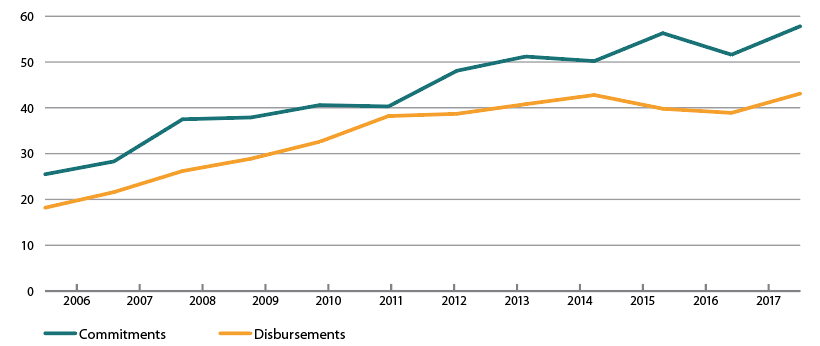WTO members launched the Aid for Trade initiative at the Sixth Ministerial Conference in Hong Kong in 2005. Aid for trade focuses on supporting developing countries, particularly the least-developed, in building trade capacity, enhancing their infrastructure and improving their ability to benefit from trade opening opportunities.
The Addis Ababa Action Agenda specifically:
- Commits to focus Aid for Trade on developing countries, in particular LDCs, including through the Enhanced Integrated Framework for Trade-Related Technical Assistance to LDCs
- Commits to allocate an increasing proportion of Aid for Trade to LDCs, provided according to development cooperation effectiveness principles; and welcomes additional cooperation among developing countries to this end.
The Addis Agenda also highlighted that monitoring of commitments can take place at three levels:
- Donor contributions to the EIF Global Trust Fund (currently US $90 million pledged) for Phase Two
- Additional donor resources leveraged through Tier 2 projects
- Additional donor resources leveraged to fund other projects/priorities — as identified through EIF support (e.g., DTIS/Update, Medium Term Programme/Trade Policy Framework)
Latest developments
In 2017, the most recent year for which data is available, global disbursements of Aid for Trade reached $43.1 billion. This represents a yearly increase of $4.2 billion (11 per cent) compared to 2016, and $25.8 billion (136 per cent) compared to the 2006 baseline recorded following launch of the Aid for Trade initiative. Commitments have also been on a steady increase. Overall, global Aid for Trade disbursed in 2006-2017 has amounted to an overall $409 billion, 27 per cent ($108.5 billion) has gone to LDCs.
Aid for trade disbursements and commitments
(Billions of United States dollars)

Source: OECD Aid for Trade Database.
The Seventh Global Review of Aid for Trade was organized in 2019 by the WTO on the theme “Supporting Economic Diversification and Empowerment”. The report underpinning the review highlights the continuing centrality of economic and export diversification as a policy objective among developing countries, and the role that economic empowerment can play to facilitate this process as well as benefit from it. The Aid for Trade new work programme for 2020-2021 will address the theme of “Empowering connected, sustainable trade”.
Relevant SDG indicator